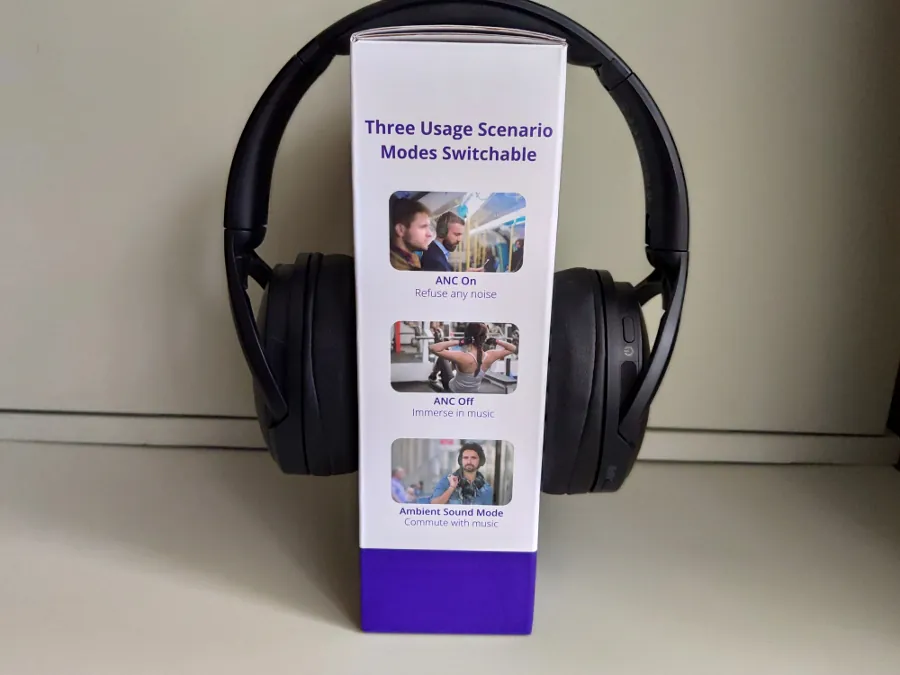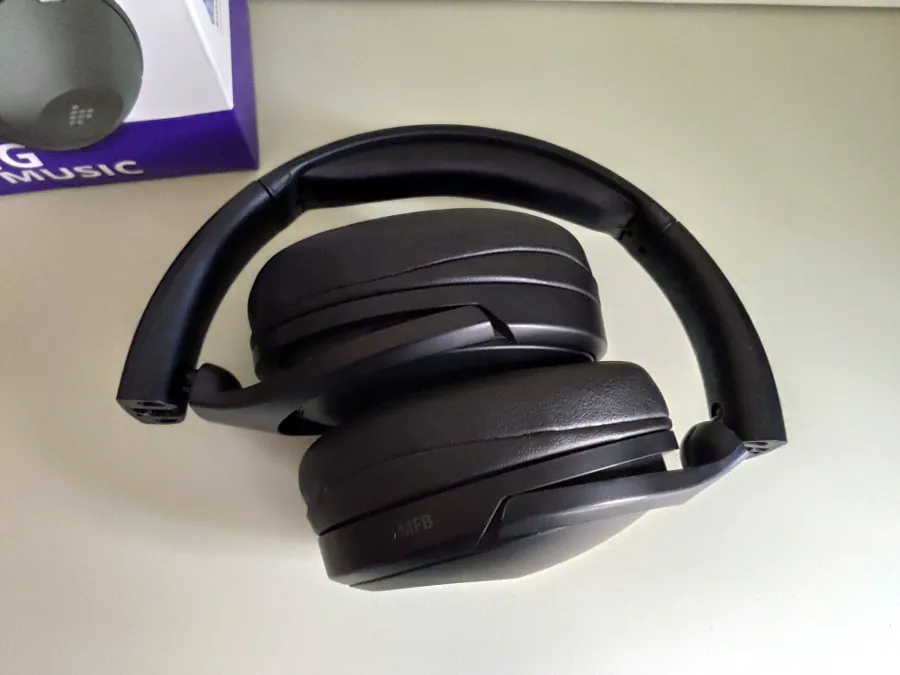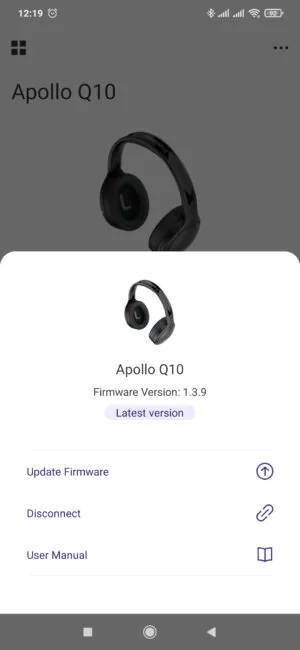© ROOT-NATION.com - Use of content is permitted with a backlink.
As you might have guessed, the hero of today’s review is the Tronsmart Apollo Q10 over-ear wireless headset. It was announced literally at the end of last year; the manufacturer boasted that the Apollo Q10 received a serious noise control system, great sound and a record battery life. It also has great controls and the folding structure.
I have been testing the headset for 2 weeks and I have something to say about it. It has many advantages, but there are some unexpected cons as well.
Read also:
- Tronsmart Apollo Bold review. TWS Headset with ANC, Great Sound and Lots More
- Marshall Major IV headphones review: Rock and roll doesn’t need wires
Tronsmart Apollo Q10 specifications
- Type: over-ear wireless headphones
- Material: body is glossy and matte plastic, ear cushions and headband covered with dense leather
- Package Includes: Headphones, USB-USB Type-C Charging Cable, Instructions, Case
- Resistance: 32 ohms
- Frequency range: 20-20000 Hz
- Speakers: 40 mm
- Weight: 220 g
- Dimensions: 196.6×174.8×88.0 mm
- Charging connector: USB Type-C
- Wireless interfaces: Bluetooth 5.0
- Battery: 1200 mAh
- Autonomy: playback – up to 100 hours (at 50% volume level), conversation mode – up to 100 hours (at 70% volume level)
- Charging time: about 3 hours
- Number of microphones: 5
- Audio codecs: SBC, AAC
- Optional: hybrid noise reduction, 3 operating modes, touch control panel
Positioning and price
Tronsmart is no longer a beginner in the field of audio gadgets and all kinds of accessories. Headphones and wireless speakers of the brand have confidently occupied the niche of solid and competitive devices with a quite adequate price tag. And the Apollo Q10 fits perfectly into this concept.

At the time of writing the official store on AliExpress asks $59.99 for headphones. Using all sorts of coupons and other AliExpress tricks, you can knock off a couple of bucks.
Read also:
- Tronsmart Onyx Free review: True-wireless earphones with UV sterilization
- Tronsmart Onyx Ace wireless earbuds review
What’s in the box
The package includes Apollo Q10 headphones, a charging cable (without an adapter, of course, what is it, 2019?), instructions and a soft case for storage and transportation.

What is noteworthy, all Tronsmart devices come in solid boxes made of thick cardboard, everything is packed nice, which means it’s great as a gift.
Design, layout of elements, materials
The Tronsmart Apollo Q10 are a full-size on-ear headphones. To make them easy to carry, the they are foldable so they take up less space in your bag or backpack. The ear cushions swivel 90° so you can hang them your neck.

Comparing the decent size and weight of the headset, it seems too light. But this has its advantages – it is comfortable to be in the headphones for several hours without getting tired, but at the same time they are firmly fixed on the head. Nevertheless, light weight, even if it is justified, will still be associated with flimsiness and unreliability in the long term.

The Apollo Q10’s body is made of fairly simple plastic, or so it seems when you take them in your hands. And, annoyingly, the movable elements (hinges and headband stretching mechanism) are also made of plastic. At the same time, the build quality is excellent, there is nothing to complain about. The main body has a matte texture, which thankfully does not show fingerprints. Only the outer side of the hoop is highlighted by a gloss, on which you can see the name of the company.

There is a soft insert under the headband to make wearing the headphones more comfortable. The material of the soft headband and ear cushions is the same, it resembles either thin leatherette or dense polyurethane with leather imitation. The material is pleasant to the touch and, I would like to believe, is quite durable. In any case, there is a hope that after a year or two of operation, it will not flake off, as it happens with budget earphones. And, it’s worth noting that the ear cushions completely cover the ear. The inside of the earbuds is traditionally covered with fabric with large “L” and “R” letters .

The main controls are hidden on the sides on the right earpiece. Looking ahead, I would like to note that all control of the headset takes place from the right headphone. There is a place for a charging connector, a power button, an indicator light and a multifunction button (located at the bottom). I like this design, because during use, neither the connectors nor the indication are visible.

From the outside, the headphones are very simple. Here you can see only a round and slightly sunken control panel (it is touch-sensitive and is located only on the right, on the left there’s a symmetrical fake), and a miniature speaker grill, which is apparently used to turn the Apollo Q10 into an open-type headset.

Read also:
- Samsung Galaxy Buds Pro review: TWS earbuds with unique features and a couple of compromises
- Logitech G733 Review: Phenomenal Headset… With An Annoying Issue
Controls
I liked the Apollo Q10’s full touchpad control on the right earpiece. Due to the fact that the panel is slightly recessed into the body, you can easily determine its location when you are wearing headphones.
Controls make use of familiar and quite logical gestures. Switching between tracks is carried out using swipes to the left and right, you can change the volume by swiping up or down, to turn on/off ANC just touch the panel and hold for 3 seconds, etc. That is, everything is convenient. Although you can change the gestures in the app. Using my headsets, I somehow got used to performing all the manipulations on my smartphone, because the controls are often stupidly inconvenient. But in the case of the Apollo Q10, there were no issues at all, the controls turned out to be very logical and comfortable, and the sensor accurately perceives gestures from the first touch.

The app is not necessary at all. It became available for the Apollo Q10 just a couple of days ago. Before that, the model was listed in the list of supported devices, but it was impossible to connect through the application.
So, the app gives us the opportunity to customize the control of the headphones, quickly activate noise control, as well as the Ambient mode. You can also update the firmware if a new version is released. The most useful thing that I found in it is the so-called equalizer, which has only 4 modes: Default, Deep Bass, Hi-Fi and Vocal. But we’ll talk about the sound separately.
Technically, having used the app once, you can forget about it for a long time. Tronsmart application is very crude (I don’t know about other headsets, but for Apollo Q10 for sure) with a very uninteresting UI. It is clear that the headset entered the market just a couple of months ago, and it’s usual for a Chinese devices to improve the software well after the release.
Read also:
- Sony WF-XB700 Wireless Earbuds Review – A Guest From The Past
- Panasonic RZ-S500W TWS Earbuds Review and Comparison with RZ-S300W
Sound
Before talking about the sound quality, I would like to share my impressions of how hybrid noise control works here. And it works well. As good as in flagship devices, even. The manufacturer emphasizes that the Apollo Q10 cuts off up to 35 dB of external noise, which is facilitated by the 5 microphones. And the work of ANC is impressive – external sounds are muffled just fine. The voice of a person a meter away from you is barely audible.

In this case, the headphones have three operating modes:
- with active noise control
- without noise control – they work just like on-ear headphones, while muffling part of the sound from the outside simply due to their format
- Ambient sound mode – with the help of microphones external sounds are sent to the listener
There are a bunch of scenarios for using headphones. From quiet in the subway or other transport to listening to music while walking around the city, when it is important to hear what is happening around you.

Now let’s get back to the sound of the headset. Frankly, at the start, the sound did not please me very much. It’s not bad by default, pretty clean, but I found it too simple. Perhaps due to the fact that the main balance here is maintained in the mid-frequency range, and the top and low frequences are suppressed to some extent. This is beneficial when listening at maximum volume (there is no wheezing or other sound artifacts), but overall the sound is a little bland. Of course, this is solved by an equalizer, but when you periodically switch from one headset to another, it not convenient.
But my impression of the sound changed when I finally managed to connect the headphones via the app. Having calibrated the sound to my liking (I chose the Deep Bass mode), the sound became more interesting. Again, this is objective. The dafault sound is fine for the most people, And for those who want something a little more interesting, there are built-in playback modes.
Read also:
- Xiaomi Haylou GT1 Plus review. Best ultra-budget TWS earbuds?
- Panasonic RZ-S300W TWS earbuds review: A Pearl in a Modest Shell
Headset feature

Most wireless headphones often don’t work well as a headset. This is often the case with the budget segment. And, unfortunately, Apollo Q10 is no exception. It often happens that when you answer a call through headphones, you can hear quite okay, but the interlocutor complains about the volume/clarity of voice transmission or about noises. In our case, everything is even worse, since during a conversation you do not either of you.
It’s a paradox, but when you receive a phone call, you get the feeling as if you hear the voice through a folded towel – the sound is too quiet and distant. Moreover, it does not depend on which mode is currently active. Noise cancellation on or off, Ambient mode… in all of these modes quality is mediocre. All in all, the Apollo Q10 doesn’t work as a headset.
Battery life

The battery life of the Apollo Q10 is way impressive. With a capacity of some 1200 mAh, the manufacturer promises up to 100 hours of listening at 50% volume. Perhaps this figure is slightly embellished, but if you use the headset for an hour or two a day, even at a higher volume, you’ll have to charge it no more than a couple of times a month. In this regard, the Apollo Q10 destroys most competitors in its segment.
I could not accurately track the charging process as the indication of the remaining charge in the application is graphical, and in the Bluetooth menu it is rounded to ten. One way or another, but after a couple of weeks of testing an average of an hour a day at maximum volume, I still have more than half of the charge left. Taking into account the fact that at the start it was less than 100%. In such a scenario, on a single charge, the headphones will last at least a month, which, of course, is great.
Read also:
Verdict
The Apollo Q10 is a compromise wireless headphone model. On one side of the scale we have a top-end noise control system and several modes, very thoughtful and really convenient touch controls, good ergonomics and comfort in use, and also incredible battery life. And on the other, there’s plastic everywhere, completely ruined headset mode and a rather mediocre app. And for some users it will be a disadvantage that the Apollo Q10 cannot be connected via cable – no connectors, except for Type-C for charging, are provided here. Perhaps, if price at the start was lower, one could easily forgive these issues, but in the current state of affairs, this model is more of a compromise solution than a must-have.

Where to buy
Subscribe to our accounts:








